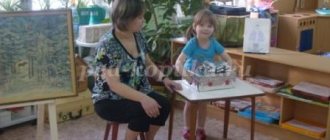“Excursion to school” with children of the preparatory group
MKDOU "Ikovsky general developmental kindergarten No. 1"
Excursion “Getting to know the school”
Teacher Lomakina E.S.
Summary of the excursion “Getting to know the school”
Tasks:
1. To develop interest in school, to consolidate children’s ideas about school: here children learn to read and write.
2. Develop attention and curiosity in children, teach children to listen to adults
3. Foster a sense of gratitude and respect for the teacher’s work.
PRELIMINARY WORK
1. Examination of the painting “School”
2. Reading and analysis of children's fiction about school life, memorizing poetry
3. Conversations, stories from adults about their studies and favorite teachers.
4. Reinforce traffic rules.
I. INTRODUCTORY PART.
Educator: Today, children, we will go on an excursion to school. Be careful, we will be crossing the road, remember the rules of behavior on the street.
II. MAIN PART.
Educator: Guys, we approached the school building. The school begins with spacious, large doors. Look how big and beautiful the school is. What do you think children are taught at school? You see, the children are in a hurry to get to school. You can't be late for school.
Children: Read. Write, sing.
Educator: The school is large and there are many students in it, more than 1000 children.
Educator: Look at the building, how many floors?
Children: Three floors.
What is the name of the area around the school?
Children: Yard, plot.
Educator: This is a schoolyard. What can you see in the schoolyard?
Children: Many flowers, big trees, These trees were planted by the first students and teachers. And in this place a large alley grew.
Educator: Guys, who do you think takes care of the flowers and trees?
Children: Teachers, schoolchildren.
Educator: Who cleans the school yard?
Children: Janitor! Well done! And who helps him?
We went to school.
(They walk along the school corridor). Look what a beautiful, spacious corridor the school has.
We approached the dining room:
Educator: Guys, what do you think is here?
Children: The boys eat here
Educator: This is the dining room where children have lunch when there is a big break. Look how clean and spacious it is, there are guards on duty here. Why are they here?
Children: Help the cooks, set the table.
Moving on
Educator: Guys, you must have a lot of strength and endurance, but what helps people to be strong, healthy, strong?
Children: Sports.
Educator: And for this purpose, physical education lessons are held at school. Now we will go to the gym. And you will see everything for yourself. During these lessons, children play, run, and learn to perform various sports exercises.
Educator: Guys, do you like to sing, dance, read poetry.
Children: Yes!
Educator: The school hosts a lot of interesting holidays dedicated to various dates, and the school assembly hall is used for them. I suggest you take a look at it. Look how big and cozy it is, there are soft chairs and a stage. And now we will look at the cozy classroom in which you will study in the next school year. Look, these are the desks and chairs you will sit at. Please sit down and rest a little. Do you like the class?
Subject knowledge
Some school subjects are simply impossible to imagine without excursions, where children’s knowledge acquired in regular lessons is expanded and deepened. Geography does not exist without a tour through the streets of your locality, without drawing up its plan, without studying the nearest geographical objects: river, hill, ravine, factory, etc. Biology cannot exist without studying the plants and fauna of your area. Many history lessons require teaching in museums. Children can get their first knowledge of astronomy at the planetarium. And there are a lot of options for conducting excursion lessons. We can say that in this case, excursions act as a visual aid to school subjects.
How to Organize a School Trip: Bureaucracy and Enthusiasm
Find an interesting museum, find out what excursion programs it has, choose an excursion and order a bus - but that’s not all! Our blogger, teacher and mother Anastasia Duryagina, tells us what bureaucratic subtleties need to be taken into account when you are planning a school excursion.
Useful Mela newsletter twice a week: Tuesday and Friday
SUBSCRIBE
Primary school tour
It so happens that I am a parent-teacher-representative of the parent committee at my eldest daughter’s elementary school. Sometimes my class and I need to get out of school, attend cultural events and excursions. Do you know how difficult it is to do this? What problems do parents, PTAs and teachers face? I have already experienced organizing three bus excursions and am ready to share my observations with you.
As a teacher, I can definitely say that collective trips to the theater, cinema and trips on various excursions are of great importance. They shape students’ worldview, moral and ethical culture, develop observation skills, and influence the formation of attitudes, habits, and help choose a line of behavior. But unprepared and ill-conceived extracurricular activities can even be harmful. For example, sometimes in schools you can see how children are forced to go to a meeting of a music club, but students are not prepared to perceive musical works. There is no talk of positive emotions in children or a friendly atmosphere in such a situation.
To make it interesting for children, it is necessary to adhere to the following requirements:
- Children need to be prepared for future trips to the theater, cinema and excursions.
- Any activities must take into account their interests.
- The age and individual characteristics of students must be taken into account.
- Excursions must be related to academic interests.
- Each event should be analyzed by children.
Problems start with documents
As soon as the teacher gives directions where he wants to take the class, the parent committee must get involved to inform parents, raise money, contact an excursion company or just a transport company.
In big cities there are no problems finding a tour desk for school excursions. Now the market for services in this area is diverse! For your money they will organize anything, almost a flight of children to the moon (I’m kidding, of course). If it’s expensive for parents (and it’s always expensive for them) and the parent committee can’t find a compromise, then you can choose a free excursion and order only a bus.
What you need to know to meet the deadline
Documents prepared by the transport company (tour bureau):
- Notification from the traffic police with details of the bus(es) assigned to your trip. The notification must include the details of the individual (full name, passport, contacts) - the organizer of the trip (responsible for the trip, charterer), who will take the notification to the traffic police. Once completed, the notice is printed in two copies and signed by the charterer. One copy remains with the traffic police, the other responsible for the trip takes it on the bus. Nowadays there is no need to be personally present at the traffic police; you can get everything you need on time using electronic document management. The traffic police notification can be filled out for an educational institution (school). Charterer - school. To do this, you must include in the notification the details of the school and the trip organizer (responsible for the trip). To register a notification with the traffic police for the school, you will need a power of attorney with a seal from the school for the trip organizer. The notice also bears the seal of the school and the signature of the principal. The school appears in the contract, but is not responsible for children or damage to property by children on the bus. The person responsible for the children is the teacher. This is clearly stated in the contract. If such a line is not in your agreement, then RONO and the director will not sign the document. Also, the school does not pay anything. She only issues an order that such and such a class will leave during school hours, then, indicating the specific location of the excursion or event.
- A charter agreement between an individual or an educational institution and a transport company (charterer) providing a bus for the trip. The charter agreement also includes information about an individual (full name, passport, contacts) or educational institution (school). The contract is checked, printed and signed by the charterer. If you fill out a contract for a school, it must have the school’s seal and the signature of the director.
- Itinerary for the trip.
- Layout of passengers on the bus.
Zoological Museum, St. Petersburg
Documents that the parent committee must have:
- List of children who will travel on the bus. A parent’s signature confirming that the child is entrusting the trip to an accompanying person is required only if the trip takes place during non-school hours or without an order or permission from the school. The traffic police is now asking for a list with the full name of each child, the full name of his parents and the phone number of one of the parents. Without this, a notice will not be issued.
- List of adult accompanying persons traveling on the bus (full name, passport details and telephone numbers).
- Order-permission to travel during school hours, signed and stamped by the school director. A memo for the trip addressed to the school director with his signature and seal.
During non-school hours, an order or memo from the school is not required by law, but almost no one is willing to spend their day off on a trip that can take almost the entire day. After verification, all documents must be taken and approved by RONO. This is usually done by the school secretary or the teacher himself. They say that now RONO does not accept parents on such issues. To prevent paper hell from falling on your heads, you should clarify the list of requested documents in advance (different schools may have different lists).
Planetarium No. 1. St. Petersburg
My class and I went out three times, in an organized manner, with bus excursions. There was always running around. One thing was not signed for us, then another, but in the end everything worked out, we sat on the bus happy and enjoyed the excursions.
Russian Ethnographic Museum, St. Petersburg
Conversation with parents
Of course, parents either agree to the event or they don’t. The parent committee needs to calculate whether they fit into the cost (bus + excursion), collect money, make an advance payment for transport.
For an excursion, payment is usually made on the spot when tickets are purchased. It happens that the parents agreed and brought the money, but on the day of the trip the child fell ill. Don’t panic, we warn the parent in advance that the money for the bus will definitely not be refunded, but for the excursion you can get a refund. The main thing is to convey information to parents in a timely manner, duplicating it in the general chat.
Russian Ethnographic Museum, St. Petersburg
Those who are just starting to fill out the documents, be careful, check the bus numbers themselves (you should be offered a main and a spare) in the documents, whether the numbers coincide with those indicated in the notification and in the technical inspection. Check the charter agreement (it is in triplicate).
I wish you, dear parents and teachers, interesting excursions and quick approval of documents. Let every trip be educational for children and adults!
Photos from personal archive
You are in the "Blogs" section. The author's opinion may not coincide with the position of the editors.
Socialization of children
On excursions, children learn the rules of behavior in different situations. How to behave in transport, in a museum, in a theater, in nature? They begin to understand that rules of behavior were invented for the convenience of people and their safety. If there may be problems with behavior the first time, then the next time it will be easier, and later these rules will become familiar.
The child develops behavioral patterns in different conditions. And he already feels much more confident in society. Students become more independent, consciously observe discipline, and are less lost in unfamiliar situations. And it’s easier for them to establish communication with strangers.
Children communication
During the excursion, by asking questions to the guide, children learn to communicate. Pre-excursion assignments require them to formulate questions precisely. Discussing what they saw, sharing impressions, summing up, they learn to speak, express their opinion, defend it, and highlight the main thing. At the same time, they listen to others, compare their opinions with their own, etc. That is, children develop communication abilities.



